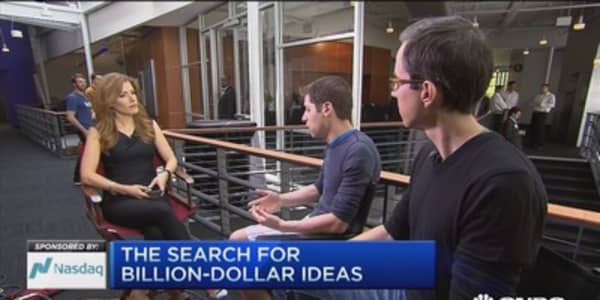Entrepreneurship has never been hotter.
For the first time in five years, the Kauffman Foundation's Startup Activity Index is on the rise in 2015—with the largest year-over-year increase in the past two decades. The group estimates that every month, some 530,000 people become new business owners.
Most of those start-ups, of course, will fail. But to increase their odds, a select handful will enlist the help of an incubator or accelerator. But that's hardly a guarantee of prosperity. The overall success rate of those accelerated organizations is mixed at best, even though many mentor seed-stage companies and help them attract equity funding.
Historically, picking an accelerator has been a combination of gut instinct and luck. But for the past four years, the Seed Accelerator Rankings Project has been helping to cut the wheat from the chaff, ranking accelerators by performance. Run by Yael Hochberg, an entrepreneurship and finance professor at Rice University's Jones Graduate School of Business, the group gathers metrics such as fundraising, participant feedback and valuations in confidence, then offers a wider look at the relative success of the programs without breaking down the deals individually. (You can find the group's full methodology here.)
Read More Meet the 2015 CNBC Disruptor 50 companies
If you're thinking about aligning your start-up with an accelerator, here are the 10 best for 2015, per the project. (Note: Y Combinator was not included in the list by its own request, as it now classifies itself as a seed fund rather than an accelerator.)
1. AngelPad
2014's third-rated program jumped to the top this year, thanks to the high satisfaction rate of its graduates, high valuations for its portfolio companies and a good track record of funding. Established by Thomas Korte, a former Google employee, its companies have raised more than $250 million in funding and generated over $800 million in exit value.
Exits include Mopub (acquired by Twitter), Adku (which Groupon grabbed), Astrid and Blink (both now Yahoo properties) and Apple-acquired Spotsetter.
2. MuckerLab
After ranking fourth last year, this Los Angeles-based accelerator jumps two spots in the 2015 rankings on the strength of its alumni satisfaction and funding numbers. All 35 start-ups that have gone through the program have been funded, with the total amount topping $250 million. And the program has over 200 mentors working with it.
3. Techstars
Last year's No. 2 ranked program slips a notch, but it's still vociferously praised for its success in valuations and the survival rate of its graduates—something that's even more remarkable in that the program hosts 12 sessions per year rather than the one to three for others on this list.
Read MoreWhy the hot IPO market is cooling off
Earlier this year, the company unveiled a $150 million seed and Series A fund to invest in graduates. Since 2007, alumni and mentors in the program have raised over $5 billion in venture capital. Pitchbook, meanwhile, notes that 77 percent of the companies that have gone through the program have raised a follow-on round.
4. University of Chicago's New Venture Challenge
The university makes a big splash in its debut year, thanks primarily to the exit size of some graduates. Notable graduates include GrubHub, which raised $200 million with its 2014 IPO, and Braintree, which was acquired by eBay for $800 million in late 2013. It's the only school-based accelerator program to make the top 10.
5. Alchemist
Valuations and a high survival rate kept this company in the middle of the top 10 this year. At its last demo day, the program says, the ratio of investors to companies was 20:1, and half of all companies that have gone through it raise more than $500,000 before that demo day arrives.
According to its most recent figures, of the 54 companies that have gone through the program, 30 have received institutional investments of $1 million or more, with an average raise of $2 million.
Read More7 innovative LA start-ups that raised millions
6. StartX
Harnessing Stanford's top entrepreneurs, this program ranks high in alumni satisfaction and funding. Though not a part of Stanford Univeristy, it supports the school's students, professors and graduates. To date, it has raised over $700 million and claims an average of $3 million per company.
It's a unique accelerator in that it takes no equity in the start-up, nor does it charge fees. Since its founding in 2011, 85 percent of its graduates are still operating.
7. Amplify
Offering three courses a year, Los Angeles-based Amplify gets high marks for the valuations and exit sizes of its graduates. Overseen by Paul Bricault, a venture partner at Greycroft and a former EVP and member of the board of directors at William Morris, graduates include everything from wine club Club W to eSports firm Battlefy.
8. 500 Startups
With a strong survival rate and network of alumni, 500 was the launching pad for Fitocracy, PicCollage and several companies that have since been acquired by Google, Angie's List and Lonely Planet.
Follow-up rounds are common, with Pitchbook finding that 75 percent of the companies in the program secured one, the second-largest proportion after Techstars.
9. Capital Innovators
This is the St. Louis-based program's second year in the top 10. With a high survival rate and an accompanying strong alumni satisfaction rate, its graduates have raised $140 million. According to the accelerator, every one of the 52 companies that have gone through its program are still operating, an impressive feat in the start-up world.
Read MoreCrowdfunding: The new business incubator?
10. Dreamit Ventures
The difference in the accelerators ranked from five to 10 were minimal, according to the project. All of them, in fact, hold their positions from the 2014 positions. Dreamit has launched 200 companies over the past six years, claiming to create more than $1 billion in enterprise value.
Its most famous portfolio company of late is SXSW sensation Meerkat (though Google's Periscope has since proved a more dominant brand). Alumni satisfaction and valuations earned the accelerator its high ranking. And according to Pitchbook, 56 percent of the companies that have gone through the program have raised a follow-on round.
—By Chris Morris, special to CNBC.com




